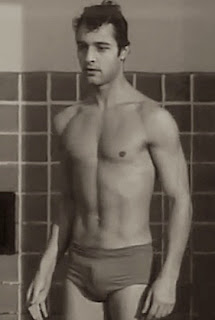I saw Sal Mineo for the first time on January 2nd, 1971, on an episode of My Three Sons. His character, Jim Bell, tries to convince college-age Robbie Douglas (Don Grady) to run away with him for a life of freedom and adventure.
Since I was already convinced that Robbie liked boys, not girls, in spite of his marriage to Katie (Tina Cole), it was easy to see Robbie trying to choose between heterosexist "normalcy" and embracing the wild passionate love of men for men.
But I didn't realize at the time that Sal Mineo was gay in real life, or that Don Grady knew it, and didn't mind.
Born in 1939, Sal was only sixteen when he starred as Plato, the gay-coded kid who develops a crush on James Dean's Jim Stark in the Boomer classic Rebel without a Cause (1955).
Except for his role as the aggressively girl-crazy Angelo Barrato in Rock, Pretty Baby (1957) with John Saxon, he selected covertly homoerotic projects: his characters mooned over a teen gang leader (played by John Cassavetes) in Crime in the Streets (1956), and fell in love-at-first-sight with an ex-con (played by James Whitmore) in The Young Don't Cry (1957). Even in the Disney Western Tonka (1958), his Native American bonded with a horse rather than a girl.
In 1957, Sal started a musical career, but his records charted poorly, in spite of teen magazine acclaim. He was a competent performer, and staggeringly handsome in a field where looks were everything, and he might have become a prominent musician, except for the rumors that were emerging in the yellow press.

To establish himself as heterosexual, Sal made the rounds of Hollywood hot spots with teen starlets, and he began putting his barbell-toned physique on display in every performance. His screen characters became heterosexual, but their practices were oddly organized around triangulations.
In The Gene Krupa Story (1959), drummer Gene Krupa (Sal) goes to New York along with his best buddy Eddie Sirota (teen idol James Darren, soon to star in Time Tunnel) to make it big in the Roaring Twenties jazz scene. Gene gets a girlfriend, then a wife, Eth (Susan Kohner), but Eddie does not; he is perfectly content to be a third wheel, making do with an occasional sultry look.
When Gene is boy-toyed by a fast-track jazz club singer, it is Eddie, not Eth, who feels betrayed: "Those girls meant nothing to me!" he exclaims, as if it is his friend Eddie, not Eth, who requires an explanation.
After many heart-to-hearts and admonitions, both Eddie and Eth tire of Gene's self-destructive boozing and partying, and leave, then return for a reconciliation. The requisite fade-out scene shows man and woman walking off into hetero-domestic bliss, but it is clear that Gene has a more intimate, passionate, and permanent relationship with Eddie.
During the 1960s, Sal demonstrated his talent as a serious dramatic actor in Exodus (1960), The Longest Day (1962), and The Greatest Story Ever Told (1965), but the rumors about his sexual identity barred him from major starring roles.
Unless he played aggressively heterosexual characters -- and displayed his physique in multiple shirtless, underwear, and nude shots, as in Who Killed Teddy Bear (1965). His muscles eased the suspicion of audiences who thought that gay men were all frail, wispy things.
The rise of gay pride in the 1960s made Sal increasingly comfortable with his identity, so just before Stonewall, he dropped the heterosexual facade, announced to the world that he was gay, and began looking for same-sex romance. He dated a number of celebrities, including (according to rumor) Don Johnson and Bobby Sherman, before settling down with After Dark model Courtney Burr.
And he returned to roles that were more overtly homoerotic, on stage as a prison rapist in Fortune and Men's Eyes with Don Johnson (and, for a brief period, former Dennis the Menace Jay North), as a gay jewel thief on SWAT Team (with Christopher George), and as a gay burglar in P.S. Your Cat is Dead.
Not to mention that episode of My Three Sons.
On the night of February 12, 1976, he was stabbed to death outside his apartment after surprising a burglar.
He left a lasting legacy as one of the first out Hollywood stars.




